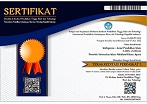PENGARUH KUALITAS PEMBELAJARAN FIQH TERHADAP PENGUASAAN DAN PENGAMALAN IBADAH SHALAT SISWA
Abstract
Abstarct:
This study is aimed to explain the quality of Fiqh learning, describe mastery of prayer, describe of students prayer practice, determine the effect of the Fiqh learning quality on mastery of prayer, find out the effect of the fiqh learning quality on the practice of the prayer, explain the effect of the quality of Fiqh learning on the mastery and practice of prayer. This study uses a method of field survey research with analyst technique. Data collection used questionnaire to determine the quality of fiqh learning quality as variable X, mastery of prayer service as a variable Y1 and the practice of prayer as a variable Y2. The results of this study indicate that: 1) the average calculation of the quality of fiqh learning is 52% and it can be categorized as good. 2) The average value of the calculation of the results of the prayer mastery test in the students 'fiqh subject was 81. 3) The average value of the students' prayer practice was 19%. 4) The influence of the quality of fiqh learning on students' mastery and practice of prayer at a significant level of 5% obtained Fcount = 11.193, Ftable = 4.04 (Fh> Ftable). Thus it can be said that the magnitude of the influence of the quality variable of fiqh learning on the mastery and practice of prayer is 34.6%. So it can be concluded that the quality of fiqh learning towards prayer and practice of prayer for students is in the weak category, namely 34.6.
Keywords: fiqh, quality of learning, prayer
Keywords
Full Text:
PDFReferences
Abidin, A. (2015). Pengaruh Pembinaan Keagamaan Islam terhadap Pengamalan Ibadah Shalat (Studi Kasus pada Anak-Anak Keluarga Petani di Dusun Kerep Desa Jombor Kec. Tuntang, Kab. Semarang Tahun 2015). Institut Agama Islam Negeri (IAIN) Salatiga.
Agustian, A. G. (2001). ESQ (Rahasia Sukses Membangun Kecerdasan Emosional dan Spiritual). Jakarta: Arga.
Guilford, J. P., & Fruchter, B. (1978). Fundamental Statistic in Psychology and Education. New York: Mc-Graw Hill.
Hanafiah, N., & Suhana, C. (2009). Konsep Strategi Pembelajaran. Bandung: Refika Aditama.
Nasukha, M., & Subaidi. (2017). Strategi Pemasaran Lembaga Pendidikan Tinggi: Pendekatan Konsep Islamic Marketing. Wahana Akademika, 4(2), 203‑217.
Sanjaya, W. (2007). Strategi Pembelajaran yang Berorientasi Standart Proses Pendidikan. Jakarta: Kencana.
Shodiqoh, S. (2018). Pengaruh Hasil Belajar Fikih terhadap Shalat Siswa di MTs Negeri 4 Sleman. Universitas Islam Indonesia.
Subaidi. (2016). Konsep Pendidikan Islam dengan Paradigma Humanis. Nadwa: Jurnal Pendidikan Islam, 10(April), 26‑49.
Sudjiono, A. (1995). Pengantar Statistik Pendidikan. Jakarta: PT. Grafindo Persada.
Sugiyono. (2007). Metode Penelitian Kuantitatif. Bandung: Alfabeta.
DOI: https://doi.org/10.34001/intelegensia.v6i1.1789
Article Metrics
Refbacks
- There are currently no refbacks.
Copyright (c) 2021 Intelegensia : Jurnal Pendidikan Islam

This work is licensed under a Creative Commons Attribution-ShareAlike 4.0 International License.
Currently this Journal is Indexed by

This work is licensed under a Creative Commons Attribution-ShareAlike 4.0 International License.











